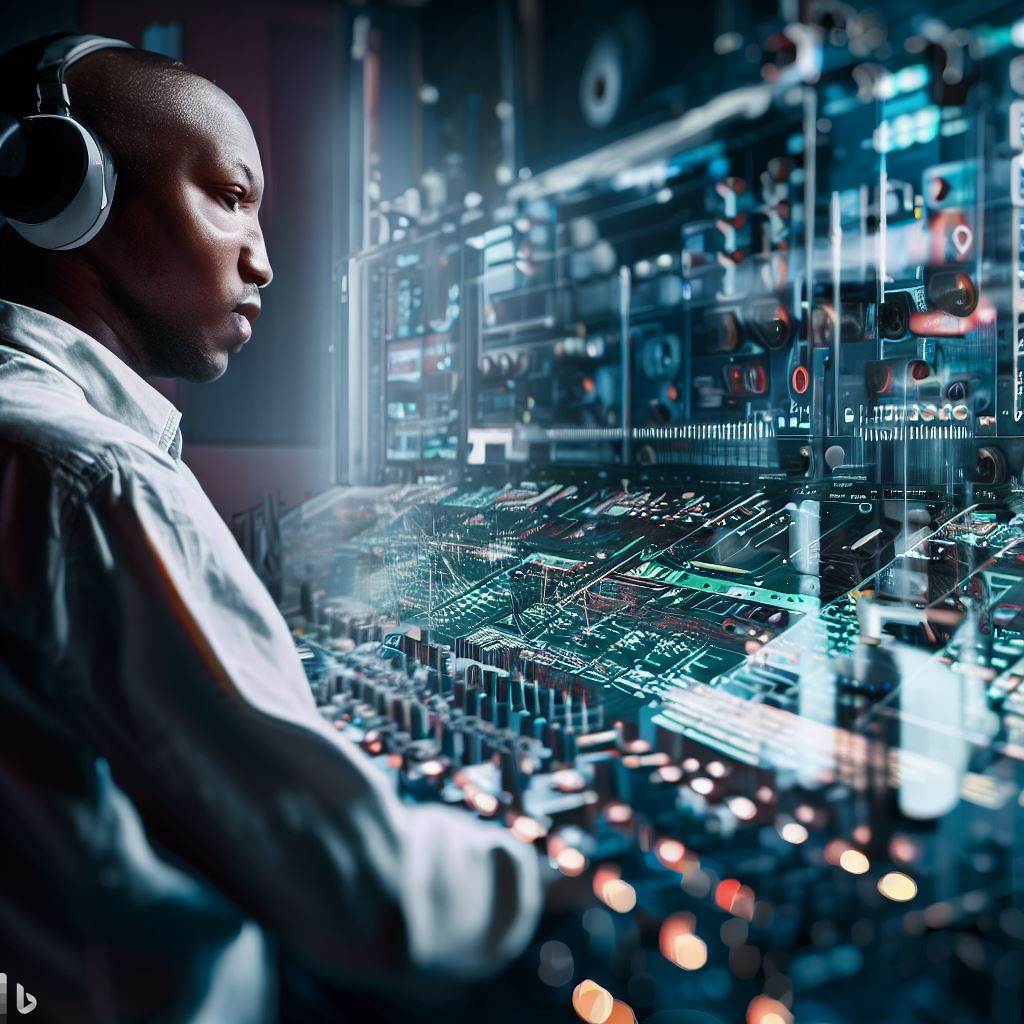Introduction
Technology has become an integral part of various industries in Nigeria. The use of advanced tools and equipment has revolutionized different sectors, including manufacturing, healthcare, and finance.
However, one field that has been significantly impacted by technology is mixing engineering. In this blog post, we will explore the impact of technology on mixing engineering in Nigeria.
With the increasing use of digital audio workstations, software plugins, and virtual instruments, the field of mixing engineering has experienced a transformation.
Firstly, the accessibility of technology has made it easier for aspiring mixing engineers to learn and practice their skills.
Previously, accessing professional-grade equipment and facilities was limited, but now, anyone with a computer and the right software can start mixing music.
Furthermore, technology has enhanced the quality of mixing in Nigeria. The advanced tools and plugins available allow engineers to achieve cleaner, more precise mixes.
With features like automation, EQ, and compression, engineers can sculpt the sound to perfection. The use of technology has also enabled collaboration and networking among mixing engineers.
With online platforms and forums, professionals can connect, share knowledge, and work on projects together, regardless of their geographical location. This has fostered growth and learning in the field.
In the end, technology has had a profound impact on mixing engineering in Nigeria. It has increased accessibility, improved the quality of mixes, and facilitated collaboration among professionals.
As technology continues to advance, we can expect further developments and innovations in the field of mixing engineering.
Evolution of Mixing Engineering
The traditional process of mixing engineering in Nigeria
The traditional process of mixing engineering in Nigeria involved manual adjustments and limited equipment.
- Sound engineers relied on their ears to make subjective decisions.
- Physical knobs and faders were used to adjust the levels of different audio tracks.
- Minimal effects and signal processing tools were available, often requiring outboard gear.
- The workflow was time-consuming and required expert knowledge and experience.
- Mixing engineers were limited by the quality of the recording and available equipment.
How the advancements in technology have revolutionized the field
The advancements in technology have revolutionized mixing engineering in Nigeria, providing more options and efficiency.
- Digital audio workstations (DAWs) have become the staple tool for mixing engineers.
- Automation features allow precise control and adjustments to audio levels, panning, and effects.
- Virtual instruments and samples offer a wide range of sounds and textures.
- Plugins and software emulations provide access to high-quality effects and signal processing.
- Remote collaboration and file sharing make it easier for engineers to work with clients globally.
- Technology has democratized mixing, allowing aspiring engineers to enter the field with affordable gear.
Specific technological tools or software used in mixing engineering
In modern mixing engineering, several specific technological tools and software have become indispensable.
- Pro Tools: The industry-standard DAW used by professionals for its advanced editing and mixing capabilities.
- Logic Pro X: Popular among Mac users, it offers a comprehensive suite of mixing tools and plugins.
- Waves plugins: Renowned for their high-quality emulations of analog gear and extensive effects library.
- Izotope Ozone: A mastering suite that provides advanced tools for finalizing mixes with professional polish.
- Slate Digital Virtual Channel: A software emulation of famous analog channel strips, allowing diverse sonic options.
Read: The Journey of a Song: From Recording to Mixing in Nigeria
Enhanced Efficiency and Accuracy
Technology has undoubtedly revolutionized the field of mixing engineering in Nigeria, bringing about enhanced efficiency and accuracy in the overall sound production process.
By automating repetitive tasks and speeding up data processing, technology has empowered engineers to work more efficiently.
How technology has improved the efficiency of mixing engineering processes
Automation of repetitive tasks
Technology has allowed for the automation of time-consuming and repetitive tasks in mixing engineering.
One significant improvement technology has brought to mixing engineering processes is the automation of repetitive tasks.
In the past, engineers had to manually adjust various parameters for every audio track, which was time-consuming and prone to human error.
However, with the aid of advanced software and hardware, these tasks can now be automated.
For instance, engineers can create presets and apply them to multiple tracks, saving time and reducing the chances of mistakes.
Automation allows engineers to focus on more creatively demanding aspects of mixing, resulting in increased efficiency.
Faster data processing
Advanced software and hardware enable faster processing of audio data, saving time and increasing efficiency. Furthermore, technology has revolutionized data processing in mixing engineering.
Advanced software and hardware provide faster processing capabilities, allowing engineers to handle large amounts of audio data swiftly.
Real-time previews, instant changes, and quick rendering of effects have become possible, significantly reducing turnaround times.
This enhanced speed and efficiency in data processing not only accelerates the overall mixing process but also grants engineers more time for fine-tuning and experimentation.
How technology has increased the accuracy of sound mixing
Real-time audio monitoring and analysis tools
In addition to improved efficiency, technology has increased the accuracy of sound mixing in Nigeria. Real-time audio monitoring and analysis tools have become indispensable in modern mixing engineering.
Engineers can now monitor audio signals and analyze their quality in real-time.
They can identify imperfections, such as unwanted noise or frequency imbalances, and make immediate adjustments to ensure optimal sound quality.
By providing real-time feedback, these tools streamline the mixing process and enable engineers to achieve more precise and accurate results.
Technological advancements provide engineers with real-time feedback on audio quality, allowing for immediate adjustments and improvements.
Digital audio workstations for precise editing
Another technology-driven development that contributes to increased accuracy is the availability of digital audio workstations (DAWs).
DAWs offer a wide array of tools and features specifically designed for sound editing and manipulation.
Engineers can perform precise edits, such as trimming, fading, and aligning audio clips, all with utmost accuracy.
The ability to zoom in on waveforms and edit at the sample level allows for meticulous adjustments and ensures precise control over the final sound.
DAWs have become essential tools that cater to the demand for precision and accuracy in sound mixing.
Digital audio workstations provide a range of tools and features for precise editing and manipulation of sound, resulting in enhanced accuracy.
In review, technology has significantly enhanced the efficiency and accuracy of mixing engineering processes in Nigeria.
Through automation and faster data processing, engineers can work more efficiently, saving time and reducing errors.
Real-time audio monitoring tools and digital audio workstations have increased the accuracy of sound mixing, enabling precise adjustments and optimal sound quality.
As technology continues to advance, it is expected to further revolutionize the field of mixing engineering in Nigeria.
Read: Challenges and Triumphs of a Mixing Engineer in Nigeria
Accessible Mixing Engineering
In the ever-evolving realm of music production, the impact of technology on mixing engineering has been particularly noteworthy in Nigeria.
This section delves into how technology has democratized and enhanced the accessibility of mixing engineering for aspiring professionals in the country.
Expanding Horizons with Online Tutorials and Learning Resources
The advent of technology has ushered in a new era of learning for mixing engineers in Nigeria. Online tutorials, webinars, and video courses have become invaluable resources.
These bite-sized lessons empower enthusiasts to grasp intricate techniques, regardless of their location. Aspiring engineers can now glean insights from industry experts and refine their skills at their own pace.
Affordable or Free Software Tools: Paving the Path to Creativity
Gone are the days when access to expensive mixing software was a barrier to entry. Technology has shattered this barrier by offering a plethora of affordable or even free software tools.
Budding mixing engineers in Nigeria can now experiment, learn, and create without worrying about financial constraints. This inclusivity fosters a dynamic and diverse community of professionals.
Bridging Distances through Remote Collaboration and Networking
Technology’s influence extends beyond learning and tools—it revolutionizes collaboration. In Nigeria, mixing engineers can now collaborate remotely with artists, producers, and fellow engineers worldwide.
Distance is no longer an impediment to creative partnerships. This virtual interconnectivity enriches the quality and diversity of work produced.
Network Growth and Opportunities: Beyond Geographical Boundaries
Networking is an essential facet of any profession, and technology has amplified its importance. In Nigeria, mixing engineers can now connect with global peers via social media, forums, and online platforms.
This exposure opens doors to international opportunities, enabling Nigerian professionals to showcase their talent on a global stage.
The impact of technology on mixing engineering in Nigeria has redefined accessibility, dismantling barriers and fostering inclusivity.
Online resources empower learning, while affordable software levels the playing field for aspiring engineers.
Remote collaboration emerges as a game-changer, enabling partnerships that transcend borders. Nigerian mixing engineers now participate in projects spanning continents, adding diversity to their portfolio.
Networking evolves in the digital age, offering access to a worldwide community. This interconnectedness propels Nigerian professionals into global circles, propelling their careers forward.
In a nutshell, technology’s impact on mixing engineering in Nigeria is transformative. The field has become more accessible, nurturing a new generation of skilled professionals.
This digital revolution highlights the power of technology in breaking down barriers.
Aspiring mixing engineers in Nigeria can now access learning materials, tools, and collaborations that were once distant dreams.
Read: Decoding the Role of a Mixing Engineer in the Nigerian Music Industry

Creative Possibilities
New creative opportunities technology has brought to mixing engineering in Nigeria
1. Introduction of virtual instruments and synthesis
In the past, Nigerian mixing engineers had limited access to physical instruments, making it challenging to add unique elements to their mixes.
However, with the advancements in technology, virtual instruments and synthesis have revolutionized the creative landscape.
These digital tools allow engineers to experiment with a wide range of sounds, textures, and melodies, expanding their creative palette.
Virtual instruments replicate the sounds of traditional instruments without requiring physical space or resources.
Nigerian mixing engineers can now easily access and experiment with various instruments like piano, guitar, drums, and more, all within their digital workstations.
This has opened up immense possibilities for creating unique and diverse sounds in their mixes.
Furthermore, synthesis has emerged as a game-changer in the field of mixing engineering. This technique involves generating sounds from scratch using oscillators, filters, and envelopes.
Nigerian engineers can manipulate various sound parameters and create entirely new sounds that were previously inconceivable.
The ability to design custom sounds adds a distinctive flavor to their mixes, setting them apart from their predecessors.
2. Manipulation of sound with effects plugins
Technological advancements have also introduced a plethora of effects plugins that allow Nigerian mixing engineers to manipulate sound in ways never thought possible.
These plugins provide engineers with an extensive range of tools to enhance, modify, and shape sounds to fit their creative vision.
One popular type of effect plugin is the equalizer, which allows engineers to adjust frequency levels, effectively sculpting the tonal balance of a mix.
Nigerian engineers can boost or cut specific frequencies to highlight or diminish certain elements, resulting in a more polished and professional sound.
Another essential tool in the mixing engineer’s arsenal is the reverb plugin. This effect simulates the acoustic characteristics of different spaces, adding depth and realism to the mix.
Nigerian engineers can now experiment with different virtual environments, creating unique sonic atmospheres that enhance the overall listening experience.
Additionally, plugins like delay, chorus, and distortion offer further creative possibilities for Nigerian mixing engineers.
These effects can add depth, width, and character to individual sounds or entire mixes, contributing to the overall artistic vision.
Success stories of Nigerian mixing engineers utilizing technology to create unique and innovative sounds
Technology has empowered Nigerian mixing engineers to push boundaries and create sounds that reflect their cultural heritage while embracing modern trends.
Many mixing engineers in Nigeria have leveraged technology to achieve international recognition and critical acclaim.
One such success story is the Nigerian mixing engineer, Kiddominant. He is renowned for infusing afrobeats with contemporary electronic music, creating a distinct sound that appeals to a global audience.
By utilizing virtual instruments and effects plugins, Kiddominant has been able to craft unique and innovative mixes that have garnered attention from renowned artists and producers worldwide.
Another notable success story is Nigerian engineer Finidi, who has gained recognition for incorporating traditional Nigerian folk music elements into popular music.
By utilizing technology, he has seamlessly blended the sounds of traditional ethnic instruments with modern electronic sounds, resulting in a genre-bending sonic experience.
These success stories exemplify how technology has empowered Nigerian mixing engineers to create sounds that are not only unique and innovative but also deeply rooted in their cultural heritage.
The impact of technology on mixing engineering in Nigeria has not only transformed the creative landscape but also elevated the country’s music industry on a global scale.
In short, the introduction of virtual instruments, synthesis, and effects plugins has expanded the creative possibilities for Nigerian mixing engineers.
These technological advancements have allowed them to explore new sounds, manipulate audio in unprecedented ways, and create unique sonic experiences.
Publish Your Professional Profile, Business or Brand
Showcase your expertise, gain trust, and boost visibility instantly on Professions.ng.
Publish NowThe success stories of Nigerian engineers who have embraced technology further demonstrate the transformative impact it has had on the country’s music scene.
With technology continuing to advance, the future of mixing engineering in Nigeria looks bright and full of infinite creative potential.
Read: Salary Expectations: What Does a Mixing Engineer Earn in Nigeria?
Challenges and Limitations
In the ever-evolving realm of mixing engineering in Nigeria, the profound impact of technology is undeniable.
However, amidst the waves of progress, there emerge challenges that deserve careful consideration.
Learning Curve and Technical Expertise Required
As technology infiltrates the mixing engineering landscape, a steep learning curve accompanies it. Engineers and producers need to grasp intricate software and hardware intricacies.
This demand for technical expertise can be overwhelming, deterring potential talents from entering the field.
Potential Loss of Organic and Traditional Sound Aesthetics
In the pursuit of precision and convenience, there’s a looming risk: the dilution of organic and traditional sound aesthetics.
Technology can inadvertently strip away the warmth and cultural richness that characterize Nigerian music.
This could lead to a homogenized sonic landscape, devoid of the uniqueness that defines the nation’s musical identity.
Finding Balance: Technology and Nigerian Musical Culture
Amid these challenges, a critical need emerges: striking a harmonious balance between technology and preserving Nigeria’s musical culture.
Preservation of Cultural Identity
Nigeria’s musical tapestry is woven with history, emotions, and stories. It’s essential to ensure that as technology advances, the core of this identity remains intact.
By infusing technology with cultural nuances, engineers can elevate the music while preserving its soul.
Embracing Technology as a Tool, Not a Crutch
Technology should be viewed as a tool to enhance creativity rather than a crutch that stifles it. Engineers must resist the temptation to solely rely on presets and automated processes.
A hands-on approach preserves the essence of the craft.
Nurturing Emerging Talent
While technology can be daunting, it’s also a gateway for new talent. The younger generation, raised in a digital age, possesses an innate familiarity with technology.
By providing mentorship that blends technical skills with artistic sensibilities, the industry can ensure the continuity of mixing engineering prowess.
Fusing Tradition with Innovation
Innovation doesn’t have to erase tradition. Embracing both can yield remarkable results. Engineers can experiment with blending traditional instruments and vocal styles with modern production techniques.
This fusion could birth a new wave of Nigerian music that resonates with diverse audiences.
Collaboration as a Catalyst
Collaboration can bridge the gap between technology and cultural preservation.
When engineers, artists, and producers collaborate, they exchange ideas that encompass both technical brilliance and cultural significance.
Together, they can sculpt tracks that are polished yet rooted in Nigerian heritage.
Education and Awareness
To address the challenges posed by technology, education and awareness are vital.
Workshops, seminars, and online resources can equip aspiring engineers with the necessary skills while emphasizing the importance of retaining cultural authenticity.
The impact of technology on mixing engineering in Nigeria is profound, but it’s essential to navigate the path mindfully.
Challenges like the learning curve and the risk of losing traditional aesthetics can be overcome through a balanced approach. The heart of Nigerian music lies in its cultural roots.
By nurturing a symbiotic relationship between technology and tradition, engineers can create soundscapes that are modern yet deeply resonant with the soul of the nation.
Ultimately, the journey to harmonizing technology and Nigerian musical culture is not without its hurdles.
However, it’s a journey well worth undertaking to ensure that the nation’s musical legacy continues to flourish in the digital age.
Conclusion
In this blog post, we explored the impact of technology on mixing engineering in Nigeria. It is evident that technology has significantly transformed the field of mixing engineering in Nigeria.
With the introduction of advanced software and tools, engineers can achieve high-quality audio production.
Technology has made mixing engineering more accessible, allowing aspiring engineers to learn and practice.
The adoption of digital mixing consoles and plugins has improved efficiency and productivity in the industry.
Furthermore, technology has empowered Nigerian mixing engineers to compete globally and collaborate remotely.
The use of virtual reality and artificial intelligence holds immense potential for future advancements in mixing engineering.
As technology continues to evolve, we can expect further innovations that will elevate the art of audio mixing in Nigeria.
The impact of technology on mixing engineering in Nigeria has been nothing short of transformative. It has paved the way for improved audio quality, increased opportunities, and a promising future for the field.
With optimism and excitement, we look forward to witnessing the continuous growth and advancement in mixing engineering.




